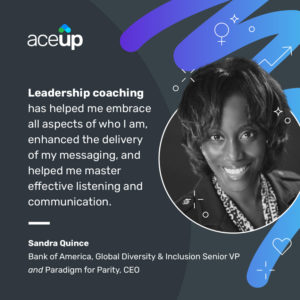Leaders of color face an entirely unique set of professional barriers to success. According to a SHRM report titled, Women in Leadership: Unequal Access on the Journey
to the Top, the barriers are even steeper for women of color. Research shows that women of color are more likely than men to encounter roadblocks to leadership roles in their organizations.
Sandra Quince, Bank of America, Global Diversity & Inclusion Senior VP and Paradigm for Parity, CEO, knows this all too well. It’s largely in part what motivated her to develop a pilot program with AceUp. The program aims to create equitable access to profit and loss (P&L) and leadership development training for multicultural women, including herself.
How does leadership coaching help?
Sandra says working with a leadership coach helped her develop confidence and feels that all women of color could benefit from working with an executive coach. Why? First of all, leadership coaching can help up-level their careers and secondly, overcome challenges in the workplace.
In part I of the Gender Equity Series, Sandra discussed how Paradigm for Parity’s new program with AceUp helps pinpoint women + leaders’ strengths and leverage them to reach their full potential. In part II, Sandra shares how her experience working with a coach transformed her ability to lead her teams and skyrocketed 🚀 her career as a c-suite executive.
Q: What was it like being coached for the first time?
A: It was certainly an impactful and life changing experience. I had never had a leadership coach before, so being able to participate was incredibly valuable. When I started the program, I looked for a coach who I trusted and who is different from me, someone who could see my pain points from a different perspective and could ultimately help me move forward as a stronger leader. There have been experiences I’ve shared with my coach that I felt were directly related to being a woman, and a woman of color. My coach really helped me sort through, reframe and dissect that experience. Earlier in my career, I went through a dark time and if I had been working with a leadership coach back then I would have bounced back quicker. That experience impacted my performance and the way I showed up. I didn’t have anybody that I felt I could trust to have the conversation around what I was experiencing, and I know other multicultural women can relate. You feel isolated, and like you’re the only one who is experiencing that. Different emotions come up – you feel guilty, insecure, inadequate – and then that shows up in how you work every day and your performance decreases. It took me years to work through that, and I think working with a coach would help multicultural women who’ve experienced similar things bounce back sooner.
There have been experiences I’ve shared with my coach that I felt were directly related to being a woman, and a woman of color. My coach really helped me sort through, reframe and dissect that experience.
Leadership Coaching has helped me embrace all aspects of who I am, enhanced the delivery of my messaging and helped me master effective listening and communication. It showed me the aspects of myself that have helped me become successful, but that they are not always needed in every moment and when to best leverage those aspects of myself.
Ultimately, I believe it was a two-fold experience ⎯ once I got past the personal investment portion of the coaching, it opened so many doors because I was able to view decision making and leadership from a new perspective. It has really been invaluable to bounce some of the decisions that I’ve grappled with as a CEO off a coach. The most surprising part of leadership coaching was tapping into my personal thought process. Most people are on autopilot, and coaching forces you to dig deeper. Leadership development coaching has really helped me hone in on the way I think and the way I show up. I discovered several things about myself through this process.
Q: What aspects of your career do you think you will approach differently going forward because of this experience?
A: I think that the way I deliver messages to my colleagues is going to change going forward because of the soft skills I have learned from this experience. By nature, I am an executor. I am a CEO who really likes to get things done. And although my intention is to be efficient, I often come across as very stoic which is not necessarily the best way to communicate. I have been able to recognize this throughout training and have learned soft skills that are going to help me know when to leverage my efficient nature and when to nuance it a bit more to make sure my messaging lands correctly and is not interpreted negatively. My coach helped me understand how to ask the right questions, slow down a bit and clarify for understanding.
My team is growing, and I want to make sure that from an effectiveness perspective that we’re growing in the right way that is sustainable over time. I also want to make sure that I’m leaving a good legacy, and that has been a key theme with my coach lately. She’s been helping me understand what that really means for me. What would make it successful? What would not make it successful? How am I looking at that and what questions should I be really thinking about as I’m restructuring the organization and setting it up for success? What will change look like for the team? My coach has really helped me to think through these bits and pieces. She’s not giving me the answers, but rather asking questions to help me confirm or redirect my thought process and open up my perspective to other thoughts and ideas.
Q: What leadership skills will you bring back to Bank of America?
A: Although most people in my position would only stay for a year, I have asked to extend my position as the CEO of Paradigm for Parity and will stay in my role until at least June of 2023 because I feel like I’m just getting started. I know there is a lot to come during my second year now that I feel more comfortable in my role. If someone had asked me before if I would run a line of business at Bank of America, I would have said “no way,” because I didn’t have the confidence or self-assurance to take on a role like that, but if asked today, I would say absolutely because of the skills I’ve learned. I am connected to Bank of America and still meet with leaders periodically, but I have also told those leaders and executives that I am not the same person that I was when I left. My experience has given me a deeper understanding of who I am as an individual, my capabilities and ultimately more confidence in my execution. I am embracing the fact that I am ok with making mistakes, and I am ready to take on new challenges. That’s how this experience has changed me.
Q: Would you continue leadership coaching after this experience?
A: Absolutely. I think coaching is vital and to be honest with you, six months was not enough time in my opinion. I do see the value in continuing because people continue to change and evolve over time, meaning that your coaching will likewise need to evolve and grow with you. I’m not the same person I was two years ago, and our country is not the same as it was two years ago. Especially for multicultural women who have certain experiences that can be enriching but also traumatizing to deal with, having a leadership coach to help navigate our changing personal lives and our changing world is critically important.
As an executive, people feel like they don’t have time for leadership coaching. You have to show up to the meetings and dedicate the time. But the question that I ask multicultural female executives to ask themselves is, “are you worth it?” If you’re worth it, then you need a coach.




